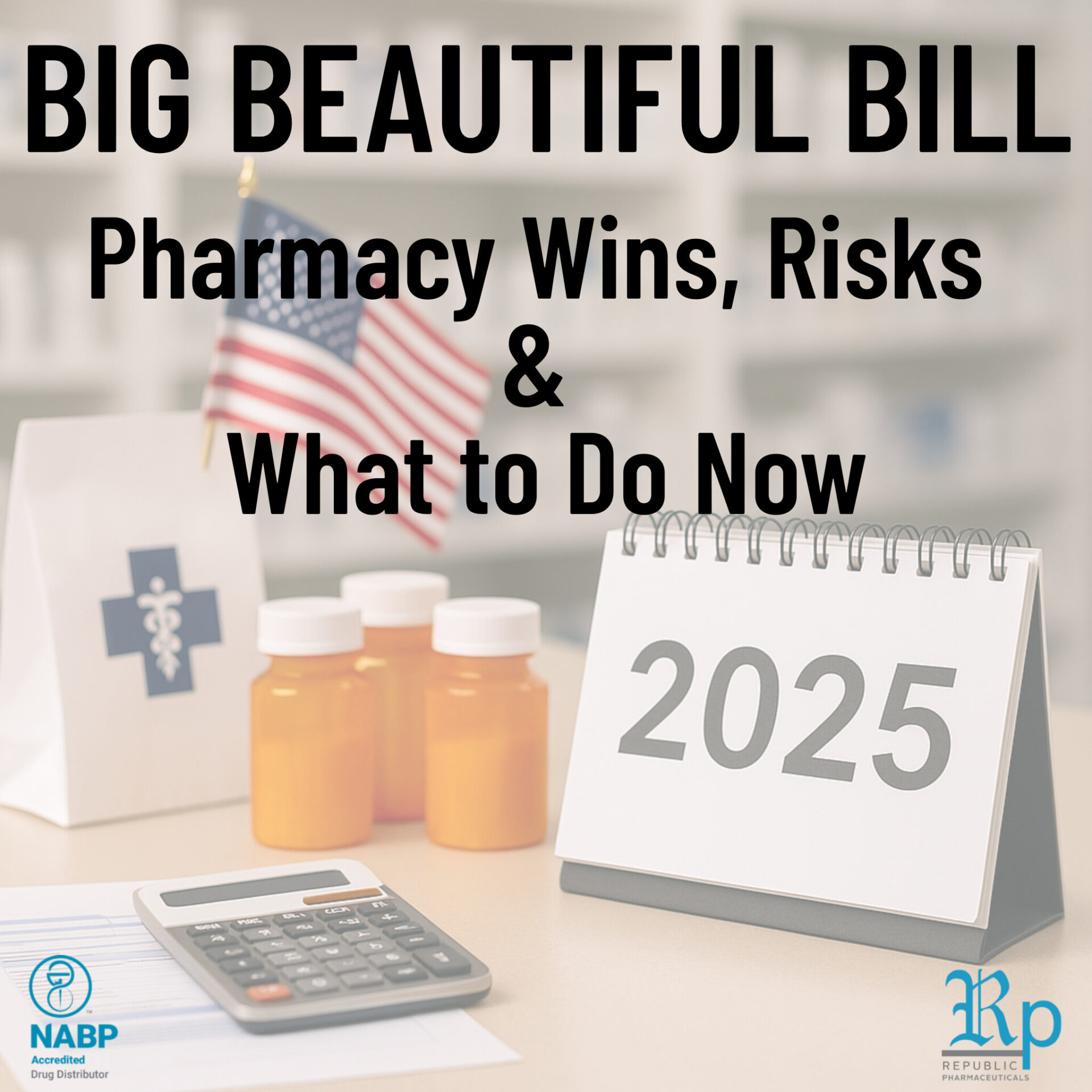The One Big Beautiful Bill (OBBB) has been signed into law. News coverage is focused on the political headlines, but for pharmacy owners, the real question is: What does this mean for my business?
If you’re curious how these changes affect patients—especially seniors—check out this guide for seniors on how the Big Beautiful Bill impacts medications, Medicare, and household budgets.
This bill brings major changes to Medicaid pharmacy reimbursement and small-business tax law. It also introduces new reporting rules that could create operational challenges if you’re not ready.
Here’s what’s changing, why it matters, and how Republic Pharmaceuticals—a top secondary pharmaceutical wholesaler can help you navigate it.
1. Medicaid “Spread Pricing” Ban
(Expected 180 days after the president signs the bill)
What changes: PBMs can no longer bill Medicaid one price and pay you a lower amount, keeping the difference. Reimbursement will now follow NADAC plus the state’s dispensing fee.
What is NADAC? It stands for National Average Drug Acquisition Cost. It’s based on what pharmacies actually pay for medications and is updated weekly by CMS.
Why it matters: If Medicaid fills have been underwater due to low reimbursements, this rule levels the playing field.
Scenario: A generic 90-day fill that previously paid below cost now reimburses at NADAC plus a set fee, finally delivering a healthy margin.
How Republic helps: When reimbursement rates depend on acquisition costs, flexible sourcing becomes critical. Republic can help you find more competitive prices than your primary wholesaler, especially when NADAC shifts unexpectedly.
2. 100% Bonus Depreciation Returns
(Applies to purchases in 2025 and 2026)
What changes: You can now deduct 100% of eligible equipment, software, and improvements in the year of purchase instead of spreading the deduction out.
Why it matters: This lowers the up-front cost of modernizing your pharmacy.
Scenario: A $160,000 packaging machine now provides $40,000–$50,000 in tax savings in year one.
How Republic helps: With flexible payment options, bulk deals, and seasonal discounts, Republic can help reduce inventory costs and free up capital to invest in long-term assets.
3. Bigger Tax Breaks for Pass-Through Pharmacies
What changes: The QBI deduction increases from 20% to 25%, and the SALT deduction cap doubles from $10,000 to $20,000.
What is QBI? Qualified Business Income deductions reduce taxable income for S-corps and LLCs. They’re not available to C-corporations.
Why it matters: Most independents are S-corps or LLCs. This means more take-home income for owners.
Scenario: A pharmacy earning $470,000 in qualified income can now deduct $117,500, rather than $94,000—cutting your tax bill by $6,000–$8,000.
How Republic helps: Republic’s sourcing flexibility and inventory management tools help you control year-end cash flow and optimize purchasing for tax planning.
4. Required Monthly CMS Cost Reporting
What changes: Pharmacies must report their drug acquisition costs to CMS every month. Noncompliance could result in fines up to $100,000.
Why it matters: Gathering and submitting this data accurately may take more time or tools than you currently have.
Scenario: A pharmacy purchasing 1,000 NDCs monthly must reconcile invoice data and discounts for each—more admin work or hiring help.
How Republic helps: Republic is working with pharmacy software vendors to offer CMS-compliant cost data exports—reducing manual entry and errors.
5. Fewer Medicaid Patients Over Time
What changes: The bill reduces Medicaid spending through work reporting requirements and tighter eligibility for adults under 65.
Why it matters: Even if your margins improve, you may see fewer Medicaid patients in-store.
Scenario: A 10% drop in Medicaid scripts could be offset by better margins—if your acquisition costs are under control.
How Republic helps: Republic offers better pricing and supports pharmacies diversifying into clinical services, immunizations, and cash programs.
Strategic Playbook for Independent Pharmacies
- Talk to your CPA about tax structure and new deductions.
- Plan equipment purchases during the bonus depreciation window.
- Start preparing for monthly CMS cost reporting now.
- Market the Medicaid pricing change as a win for patients.
- Get nimble with sourcing—Republic can help you adapt faster than a locked-in primary wholesaler.
Frequently Asked Questions
When does the Medicaid spread pricing ban take effect?
The spread pricing ban will take effect 180 days after the bill is signed into law. Pharmacies should prepare now for NADAC-based reimbursements.
What is NADAC and why does it matter?
NADAC (National Average Drug Acquisition Cost) reflects what pharmacies actually pay for medications. It will be used to set Medicaid reimbursement rates under the new law.
Who qualifies for the 100% bonus depreciation?
Any pharmacy making eligible equipment, software, or facility purchases in 2025 or 2026 can claim the full deduction in the year of purchase.
Do I need to change how I report to CMS?
Yes. Pharmacies will be required to report monthly drug acquisition costs to CMS. Missing or inaccurate reports may trigger fines up to $100,000.
Will the number of Medicaid patients drop?
Possibly. Tighter eligibility rules and work reporting requirements for adults under 65 may reduce Medicaid volume at independent pharmacies.
Final Word
The Big Beautiful Bill isn’t just about tax cuts or politics. It’s about giving independent pharmacies a window to adapt, reinvest, and improve margins—while also raising the bar on reporting and accountability.
Republic Pharmaceuticals is here to support that transition. As a trusted secondary pharmaceutical wholesaler, we can help you find better margins, stay compliant with CMS rules, and redirect cash flow toward investments that move your business forward.
Compared to many primary wholesalers, we provide more pricing agility, faster response times, and tailored support that meets the realities of Medicaid and NADAC-based reimbursement.
Take a look at your sourcing strategy, reporting tools, and tax setup. You don’t have to do it alone—and you shouldn’t wait. The next six months could define your next five years.
About Republic Pharmaceuticals
Republic Pharmaceuticals is a VAWD accredited licensed secondary pharmaceutical wholesaler based in Michigan, serving independent pharmacies, long-term care facilities, veterinary practices, and healthcare organizations nationwide.
With a focus on transparency, access, and flexibility, Republic offers contract-free pricing, no drug allocations, and multiple payment options—including credit cards and 30-day terms. Whether you’re managing a shortage or optimizing your purchasing strategy, Republic is committed to helping your pharmacy thrive.

